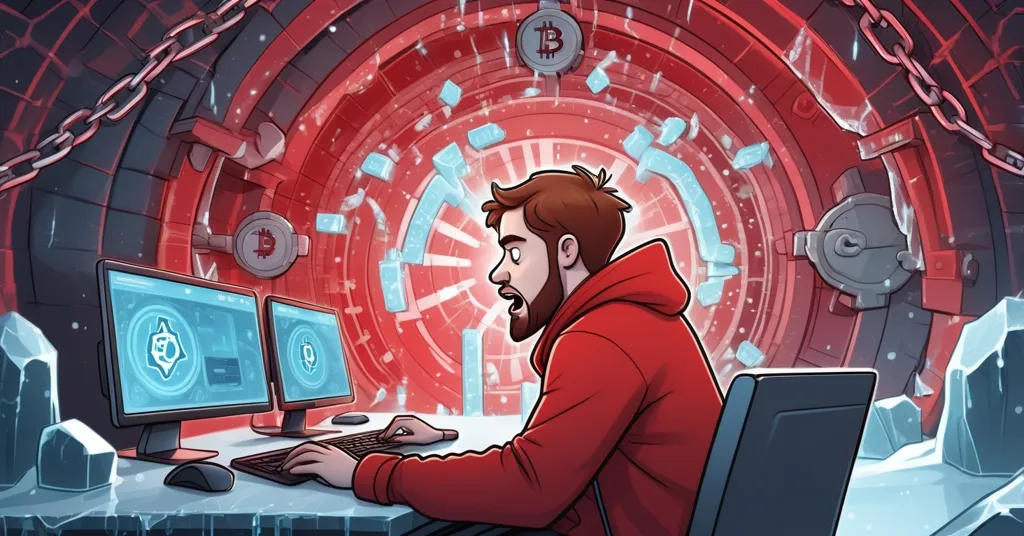Coinbase CEO Admits Account Freezing Crisis, Launches Major Reforms to Rebuild Trust

Coinbase Account Freezing Crisis: CEO Brian Armstrong Admits ‘Major Issue’ as Reforms Kick Off
Coinbase CEO Brian Armstrong has finally addressed the elephant in the room: account freezing has been a “major issue” at the cryptocurrency exchange for way too long. As a leading centralized platform, Coinbase’s public admission and ongoing reforms signal a push to mend user trust, but the road ahead remains bumpy with regulatory hurdles and lingering user frustrations.
- Freezing Fiasco: Brian Armstrong calls account freezes a persistent “major issue.”
- Reforms in Action: New leadership slashes lockouts by 82% with tech upgrades.
- User-Centric Moves: KYC and source-of-funds checks now integrated in-app for quicker fixes.
The Freezing Problem Unpacked
For those new to the crypto game, account freezing is when an exchange like Coinbase restricts access to your funds or account, often due to compliance with anti-money laundering (AML) laws, Know Your Customer (KYC) requirements, court orders, sanctions, or security concerns like suspected scams or hacked accounts. AML laws aim to prevent illegal financial activities, while KYC involves verifying customer identities—both often lead to temporary locks for investigation. In theory, these measures protect users and satisfy regulators. In practice, they’ve left countless Coinbase customers stranded, unable to access their money for days or weeks. It’s a bitter pill for a community rooted in Bitcoin’s promise of financial sovereignty, where the mantra “not your keys, not your crypto” reigns supreme.
Coinbase, under the microscope of global authorities like the U.S. Securities and Exchange Commission (SEC) and Financial Crimes Enforcement Network (FinCEN), has often erred on the side of caution. The result? Overzealous restrictions that have sparked backlash from users who expect seamless control over their assets. This isn’t just a Coinbase problem—it’s an industry-wide tightrope walk between regulatory demands and the decentralized ethos of blockchain tech. Armstrong’s candid admission, as highlighted in recent discussions on account freezing being a significant concern, isn’t just a confession; it’s a recognition that user experience can make or break adoption in this cutthroat space.
“Freezing customer accounts ‘is a major issue’ for far too long.” — Brian Armstrong, Coinbase CEO
Reforms Under Dor Levi: A Tech-Powered Turnaround?
Enter Dor Levi, a fresh face at Coinbase who, just nine weeks into the job, is spearheading a mission to overhaul account restriction policies. His goal is blunt: fix unnecessary freezes. Under his leadership, the exchange has cut lockouts by an impressive 82%. How’d they pull it off? By sinking resources into machine learning models that act like a smarter spam filter—learning over time to better distinguish between legit users and actual risks, reducing false positives (those annoying instances where legit activity gets flagged as suspicious). Add to that beefed-up infrastructure and empowered teams, and you’ve got a recipe for fewer unwarranted restrictions, as detailed in recent updates on Coinbase policy changes.
Beyond tech, Coinbase is tackling the user experience head-on. Manual processes like source-of-funds checks—where users must prove where their money came from—and enhanced KYC steps are now being baked into the app. No more waiting for a support ticket to crawl through the system; users can resolve these issues themselves. It’s a nod to automation and empowerment, mirroring an industry trend to cut out slow, frustrating middlemen. Levi has made it clear that freezes should only happen in specific cases: court orders, sanctions, or to shield users from scams or compromised accounts. Anything else is a fail on their part.
“The goal is simple: ‘fixing unnecessary account restrictions.’ Account freezes should only happen in cases involving court orders, sanctions, or when protecting users from scams or compromised accounts.” — Dor Levi, Coinbase Leadership
But let’s not get carried away with praise. An 82% drop in lockouts is a big win on paper, and it aligns with the spirit of effective accelerationism—using tech to speed up crypto’s mainstream takeover, even if it’s a centralized player driving the change. Yet, the devil’s in the details, and user complaints are still stacking up faster than altcoin scams in a bull run, as seen in various user experiences shared online. Progress? Yes. Mission accomplished? Not by a long shot.
VPN Controversy: Privacy vs. Security Clash
One sticking point is Coinbase’s handling of Virtual Private Networks (VPNs), tools many crypto users rely on to mask their internet location for privacy or to bypass regional restrictions. In December 2024, EthHub co-founder Eric Conner found his account locked simply for using a VPN. Coinbase Product Director Scott Shapiro defended the move, noting that VPNs often trigger risk models due to their association with malicious actors. It’s a logical stance—fraudsters do use VPNs to hide their tracks. But Conner called it “lazy,” and he’s not wrong. Casting a wide net that snags legit users alongside bad actors is a clumsy way to play security guard, especially in a space where privacy is sacrosanct, a concern echoed in discussions about why such freezes occur.
This isn’t a one-off gripe. Other users have echoed similar frustrations, with some facing weeks-long freezes for mundane actions like transferring pocket-change amounts of crypto. For a community that includes Bitcoin maximalists and decentralization diehards, this feels like a betrayal. VPNs are often a lifeline, especially for users in countries with heavy internet censorship or government crackdowns on crypto. Flagging them as inherently suspicious isn’t just tone-deaf—it’s a direct jab at the values of anonymity and freedom that birthed Bitcoin. Would you trade privacy for a false sense of security, or is this a dealbreaker with centralized platforms like Coinbase?
User Backlash and the Trust Gap
Despite the reforms, the trust gap looms large. Take the human impact: imagine a small-time trader unable to pay rent because their funds are frozen over a minor KYC hiccup. These aren’t just tech glitches—they’re real-world headaches that fuel community backlash. While Armstrong has urged affected users to reach out directly if their account is locked for non-legal or non-sanction reasons, the fact that such a call-to-action is needed speaks volumes. Support channels in crypto are notorious black holes, and even with in-app fixes, not every case gets resolved swiftly, a frustration shared by many in online forums discussing account issues.
“If your account is still restricted and it’s not due to legal or sanction reasons, reach out to Coinbase Support via DM.” — Brian Armstrong, Coinbase CEO
Competitors like Kraken and Binance aren’t immune to similar controversies, but they’ve dodged the same level of heat recently. Kraken, for instance, has leaned into a pro-privacy stance at times, while Binance offers more flexible onboarding in certain regions (though with its own regulatory baggage). If Coinbase can’t close the trust gap, users might jump ship—or better yet, ditch centralized exchanges altogether for non-custodial wallets, where you hold your private keys and no one can lock you out (think of it as owning your house versus renting from a landlord who can change the locks). That’s the Bitcoin way, after all.
Regulation vs. Decentralization: The Bigger Picture
Zooming out, Coinbase’s saga lays bare a core tension in crypto: centralized platforms are squeezed by regulatory overreach while trying to serve a community that craves permissionless freedom. As a regulated giant, Coinbase faces immense pressure from agencies like the SEC and FinCEN, risking fines, lawsuits, or shutdowns if they don’t comply. Contrast that with decentralized finance (DeFi) protocols, which often operate in a legal gray zone, sidestepping such oversight by design. It’s why many users see centralized exchanges as a necessary evil—a bridge to mass adoption until DeFi matures with better usability and scalability. The role of KYC in shaping user account security remains a critical discussion point in this context.
But over-compliance comes at a cost. Every frozen account is a reminder that centralized players, no matter how innovative, can’t fully embody the trustless, peer-to-peer vision of Bitcoin. Armstrong and Levi insist this isn’t a one-time fix, with new checks and balances to keep iterating, as noted in recent statements from Armstrong on broader reforms. Yet without clear benchmarks or a timeline for “solved,” skepticism lingers. Are these reforms a genuine pivot, or just damage control after years of user outcry?
Bitcoin’s Ethos as the Ultimate Benchmark
Let’s be real: Bitcoin itself doesn’t have an account freezing problem. Its design—decentralized, trustless, and peer-to-peer—means no middleman can lock you out of your funds if you hold your own keys. Coinbase’s struggles are a stark contrast to that purity, a reminder of why many of us champion Bitcoin over centralized systems, even if it’s not yet perfect for mainstream use due to scalability or learning curves. Every step Coinbase takes toward better user experience is a win for adoption, but they’re still playing catch-up to the ideals we hold dear, a perspective reinforced by the history and structure of Coinbase as a platform. True disruption doesn’t tweak risk models—it builds systems where permission isn’t even a question.
Key Questions and Takeaways
- Why are account freezes such a persistent problem for Coinbase?
They stem from strict compliance with AML and KYC regulations, legal obligations like court orders, sanctions, and security measures against scams or hacks. Overly cautious policies often lead to unnecessary restrictions, clashing with user expectations of seamless access. - How has Coinbase slashed unnecessary lockouts by 82%?
Through investments in machine learning for sharper risk detection, infrastructure upgrades, and enhanced team capabilities, they’ve cut down on false positives and unwarranted freezes significantly. - Why do VPNs trigger account restrictions, and is this approach fair?
Coinbase flags VPNs due to links with malicious activity, per Product Director Scott Shapiro. Critics call this “lazy,” arguing it unfairly targets legit users who rely on VPNs for privacy—a fundamental value in crypto. - Are Coinbase’s reforms enough to rebuild user trust?
Progress is clear, but lingering complaints over VPN flagging and unresolved freezes suggest trust isn’t fully restored. This could push users toward competitors or non-custodial solutions. - What does this reveal about regulation versus decentralization in crypto?
It highlights the clash between centralized exchanges’ regulatory burdens and Bitcoin’s decentralized promise, questioning if platforms like Coinbase can align with the freedom crypto stands for. - How do Coinbase’s reforms impact Bitcoin adoption?
Improved user experience boosts trust in crypto platforms, encouraging wider adoption. However, persistent issues remind us that Bitcoin’s true strength lies in sidestepping centralized control altogether.



